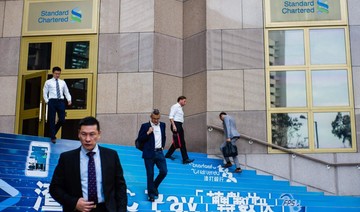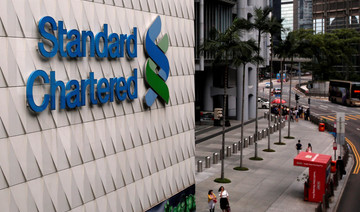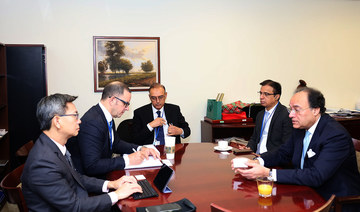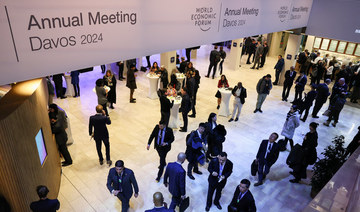HONG KONG/LONDON: Standard Chartered on Tuesday said it would cut $700 million in costs and exit smaller businesses, as part of the lender’s new three-year strategy overhaul to boost growth.
The bank plans to achieve return on tangible equity of at least 10 percent by 2021, from 5.1 percent last year, and intends to distribute to shareholders surplus capital not deployed to fund additional growth.
Earnings growth and divestment are likely to generate that surplus capital, it said in the earnings statement, adding planned exits and the run-down of low-return businesses include discontinuing ship leasing and completing the sale of its private equity arm.
“We will achieve this through relentlessly focusing on where we have a distinct competitive advantage, attacking the residual causes of lower returns and ramping-up innovation and productivity,” Chief Executive Bill Winters said in a statement.
StanChart shares have fallen 40 percent since Winters, a former JPMorgan Chase & Co. banker, took over the bank in June 2015. Last year, the bank’s London shares dropped 22 percent compared with a 15.6 percent fall for rival HSBC Holdings.
The 150-year-old lender’s new strategy comes at a time when its core emerging markets face increasing risk of slowdown due to the impact of the Sino-US trade war as well as economic uncertainties in China and Britain, two of its main markets.
StanChart, which generates the bulk of its revenue in Asia, has seen its fortunes slump in recent years as restructuring under Winters repaired a balance sheet hit by excessive lending in the previous decade, but left the bank struggling to lift profit.
Winters, in additions to cutting risky lending, has also worked to improve senior bankers’ accountability and exit some businesses.
To stimulate growth, StanChart has poured money into retail banking and wealth management technology platforms, a move which led to a surge in costs but has yet to yield significant return.
Chief Financial Officer Andy Halford told staff in October the bank had made “virtually no progress” in meeting cost targets and urged managers to consider cutting jobs, paring back travel expenses and freezing recruitment.
The bank’s costs grew 2 percent in 2018 to $10.1 billion. However, it said, “continued cost discipline” would enable sustained investment.
Hong Kong shares in StanChart extended their morning gains to be up more than 2.6 percent in the afternoon session, while the main Hong Kong market index was trading down 0.6 percent.
Earlier, the bank posted a 5.5 percent rise in 2018 pre-tax profit, pulled down by $900 million in provisions set aside to cover any impact from regulatory investigations in the United States and Britain.
StanChart last week said the provision related to the potential resolution of US investigations into alleged sanctions violations and foreign exchange trades.
The emerging markets-focused bank booked profit of $2.55 billion, versus $2.42 billion in 2017.
Before provision for regulatory matters, restructuring and other items, StanChart reported a profit of $3.9 billion, compared with the $3.9 billion average of 16 analyst estimates compiled by Refinitiv.
StanChart to cut costs, divest businesses in fresh growth strategy
StanChart to cut costs, divest businesses in fresh growth strategy
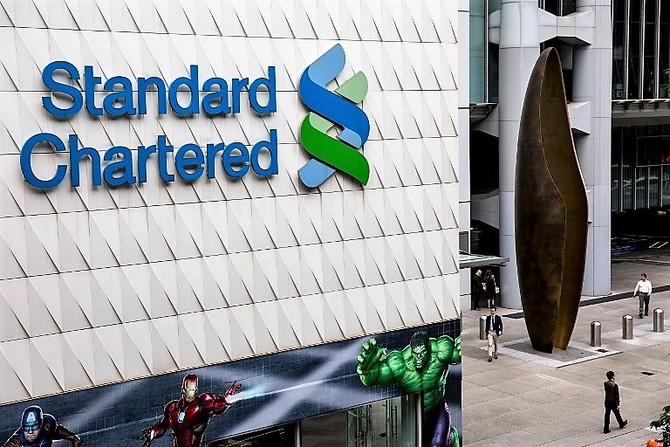
- The bank plans to achieve return on tangible equity of at least 10 percent by 2021, from 5.1 percent last year
- It intends to distribute to shareholders surplus capital not deployed to fund additional growth
Mitsui to join with ADNOC and others in LNG project in UAE, Nikkei reports

TOKYO: Japan’s Mitsui & Co plans to participate in a $7 billion liquefied natural gas project in the UAE, teaming up with Abu Dhabi National Oil Co. and others, the Nikkei reported on Tuesday.
ADNOC will participate with a stake of around 60 percent and Mitsui with 10 percent of the project, the Nikkei said, adding Mitsui’s investment is estimated to be several tens of billions of yen.
Other oil majors Shell, BP and Total Energies are also expected to invest, the report said.
The companies aim to produce about 10 million metric tons of LNG per year, the report said.
Pakistan eyes new IMF loan by early July, finance minister says
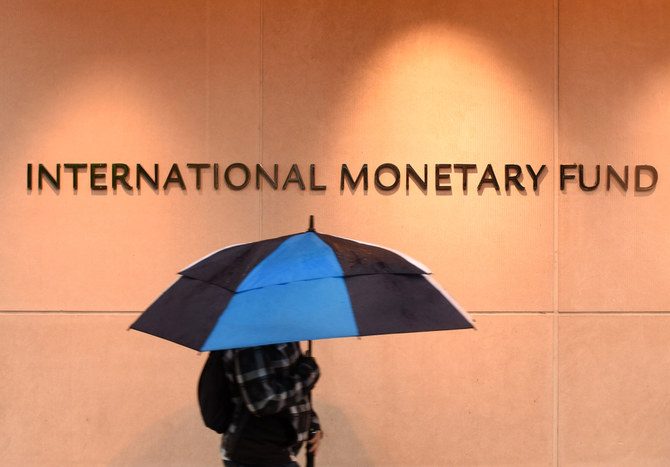
ISLAMABAD: Pakistan could secure a staff-level agreement on a new long-term larger loan with the International Monetary Fund by early July, its finance minister said on Tuesday, according to Reuters.
The country’s current $3 billion arrangement with the fund — which it secured last summer to avert a sovereign default — runs out in late April.
The $350 billion South Asian economy faces a chronic balance of payment crisis. The government is seeking a larger, long-term loan to help stabilize economic activity and financial markets so it can execute long-due, painful structural reforms.
If secured, it would be the 24th IMF bailout for Pakistan.
“We are still hoping that we get a staff-level agreement by June or early July,” Finance Minister Muhammad Aurangzeb told a conference in Islamabad.
He returned from Washington last week after leading a team to attend the IMF and World Bank’s spring meetings.
“We had very good discussions in Washington,” he said.
He said he did not know at this stage the volume and tenure of the longer program, although he has previously said that he was looking for at least a three-year bailout plan.
Both sides have said they were already in discussions for the new loan. A formal request, however, will be made once the current facility expires, with the IMF board likely to meet late this month to approve the second and last tranche of the current support scheme.
The economy is expected to grow by 2.6 percent in the fiscal year 2024, the finance minister said, adding that the inflation was projected at 24 percent, down from 29.2 percent in fiscal 2023. It touched a record high of 38 percent last May.
Aurangzeb said structural reforms would include increasing the government’s tax revenue-to-GDP ratio to 13 percent to 14 percent in next two or three years from the current level of around 9 percent, reducing losses of state-owned enterprises through their privatization, and better management of the debt-laden energy sector.
Oil Updates – prices stabilize, Middle East tensions remain in focus

NEW DELHI: Oil prices edged higher on Tuesday, after falling in the previous session, as investors continued to assess the risk from geopolitical concerns in the Middle East, according to Reuters.
Global benchmark Brent crude oil futures traded 18 cents higher at $87.18 a barrel by 9:34 a.m. Saudi time, and US West Texas Intermediate crude futures also gained 16 cents to $82.06 a barrel.
Both benchmarks fell 29 cents in the previous session on signs that a recent escalation of tensions between Israel and Iran had little near-term impact on oil supplies from the region.
“The unwinding of geo-political risk premium has dented crude oil prices recently as supply was not disrupted meaningfully,” said Sugandha Sachdeva, founder of Delhi-based research firm SS WealthStreet.
But the evolving geopolitical landscape remains critical in steering crude oil prices, she said.
“While there are no indications of an imminent full-scale war between the countries involved, any escalation in tensions could quickly reverse the current trend,” Sachdeva added.
ANZ analysts echoed the sentiment and highlighted US approval of new sanctions on Iran’s oil sector that broaden current sanctions to include foreign ports, vessels and refineries that knowingly process or ship Iranian crude.
Also, EU foreign ministers agreed in principle on Monday to expand sanctions on Iran after Tehran’s missile and drone attack on Israel, the bloc’s foreign policy chief Josep Borrell said.
“The geopolitical backdrop is still very fraught with so many risks at the moment, so clearly we’re going to see a lot of volatility until there’s a lot more clarity around it,” the ANZ analysts said in a podcast.
Israeli troops fought their way back into an eastern section of Khan Younis in a surprise raid, residents said on Monday, sending people who had returned to abandoned homes in the ruins of the southern Gaza Strip’s main city fleeing once more.
Investors are waiting for the release of the US gross domestic product figures and the March personal consumption expenditure data — the Fed’s preferred inflation gauge — later this week to assess the trajectory of monetary policy.
US crude oil inventories are expected to have increased last week while refined product stockpiles likely fell, according to a preliminary Reuters poll of analysts.
“Sticky US inflation figures, hawkish statements from key Fed officials, and rising US inventories are all acting as constraints on crude oil price growth,” Sachdeva said.
Pakistan hopes to get new IMF loan by early July, says finance minister
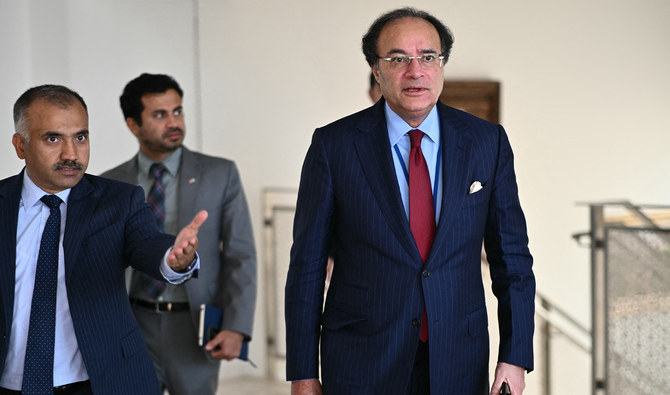
- Pakistan’s current $3 billion financial arrangement with IMF expires in late April
- Islamabad is seeking “bigger,” long-term loan to ensure macroeconomic stability
Pakistan is hoping to reach a staff-level agreement with the International Monetary Fund by June or early July, its finance minister said on Tuesday.
The country’s current $3 billion arrangement with the fund runs out in late-April, which it secured last summer to avert a sovereign default.
Islamabad is seeking a long-term bigger loan to help bring permanence to macroeconomic stability as well as an umbrella under which the country can execute structural reforms.
“We are still hoping that we get a staff-level agreement by June or early July,” Finance Minister Muhammad Aurangzeb told a conference in Islamabad.
He returned from Washington last week after leading a team to attend the IMF and World Bank’s spring meetings. “We had very good discussions in Washington,” he said.
He said he did not know at this stage the volume and tenure of the longer program.
Riyadh prepares to host special meeting of World Economic Forum

- The aim of the gathering is to find solutions to global challenges relating to humanitarian issues, the climate and the economy
RIYADH: Final preparations are taking place this week in the Saudi capital, Riyadh, for a special meeting of the World Economic Forum in the city on April 28 and 29.
Heads of state and senior executives from the public and private sectors are expected to be among the participants, who will discuss a range of global economic issues and developments under the theme “Global Collaboration, Growth and Energy for Development.”
The aim of the meeting is to find solutions to a host of global challenges relating to humanitarian issues, the climate and the economy. On the sidelines of the main event, the Kingdom will host exhibitions and other events to highlight the latest developments and trends in areas such as sustainability, innovation and culture.
The selection of Riyadh as host of the special meeting reflects the extensive partnership between Saudi Arabia and the WEF, officials said.
It builds upon the Kingdom’s active participation and contributions to the WEF’s Annual Meetings in Davos.
The agenda is designed to rekindle the spirit of cooperation and collaboration with various panel discussions, workshops, and networking opportunities. It represents a significant gathering of global leaders and experts dedicated to forging a path toward a more resilient, sustainable, and equitable world.



